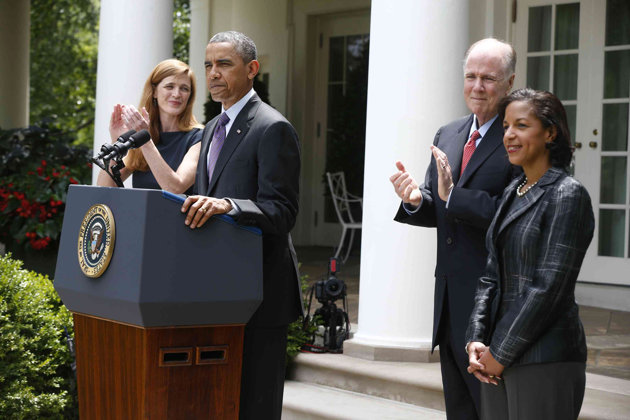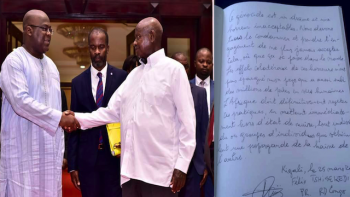On Monday, July 21, 2020, presumptive Democratic US presidential nominee Joe Biden said that he is vetting four Black Women as candidates from whom he will choose his running mate (see AfroAmerica Network: Joe Biden's Top Black Women VP Pick Contenders). On August 5, 2020 Los Angeles Mayor Eric Garcetti, co-chair on Biden's VP selection committee, told the Washington Post that Joe Biden is looking for a running mate able to give him the "best advice before the biggest decisions, who can really be his partner and who can be deployed whether on Capitol Hill or to a foreign capital... somebody who can be the President, the Vice-President and the Councillor." Meawhile, Rwanda, the small country in Africa, has become one of the topic in the vetting process.
The top priorities are Climate, International trade, Homeland Security, Economy , Pandemic, Building a Multiracial Democracy and Racial Justice in America. One of the candidate being pushed at the top is Dr Susan Rice. Her outstanding profile and background can address most of the priorities on the agenda. However, these strengths are being weighted down by her controversial past relations with the Rwandan Dictator General Paul Kagame.
Dr. Susan Rice, AfroAmerica Network Woman of 2011, and Rwanda
Dr Susan Rice is AFROAMERICA NETWORK WOMAN OF YEAR 2011 (see AfroAmerica Network: AfroAmerica Black of Year).
Then, AfroAmerica Network had remarked that "She is known to be the one woman in the world dictators, especially African dictators fear the most; from the late General Mobutu Sese Seko Wa Zebanga, to the old generation Zimbabwean Robert Mugabe to the new breed of African dictators, like General Paul Kagame of Rwanda or Joseph Kabila of the Democratic Republic of the Congo (DRC)."
Supporters of Dr. Susan Rice credit her with courageously confronting Zimbabwean President Robert Mugabe, and her attempts to negotiate with Rwandan Dictator Paul Kagame following the invasion of the Democratic Republic of the Congo and systematic killings of millions of Congolese civilians and Rwandan refugees in Eastern DRC.
But other independents critics say that Dr Susan Rice's major weaknesses include protecting the Rwandan dictator Paul Kagame, who allegedly was a former consulting client of hers, from international efforts to stop the mass atrocities and crimes, labelled in the 2010 United Nations Mapping Report as "if proven before a competent court, could be characterized as crimes of genocide," in DR Congo, set off by rebels and proxy militias created, backed and funded by Paul Kagame's army and generals. More than 6 million Congolese civilians and Rwandan refugees , mostly children and women during these mass atrocities and crimes, committed by Rwandan troops and its militias. Susan Rice's supporters have defended her, arguing that although she was easy on Paul Kagame in public, she was far tougher on him in private.
Dr Susan Rice and Rwandan Dictator Paul Kagame: Past Divergences and Personal Attacks?
In 2011, Susan Rice went on offensive against African dictators, especially the Rwandan dictator Paul Kagame. In a speech at the Kigali Institute of Technology (KIST) on November 23, 2011, Dr. Susan Rice pointed to the lack of democracy and respect of human rights in Rwanda as one of the major challenges facing Rwanda and Rwandans. Perhaps referring to her role in 1990-1997 events in the great lakes region of Africa, she told the Rwandan leadership that she “believe[s] as well that friends should speak to friends,” that “the political culture in Rwanda remains comparatively closed,” while “yet, the world is moving rapidly in a different direction.”
Rwandans, especially those in the opposition were overjoyed. However, General Paul Kagame was not amused. In a public speech on Saturday November 26, 2011, General Paul Kagame made the following comments in Kinyarwanda, while referring to the statement made by Ambassador Susan Rice (the translation is based on General Paul Kagame’s speech and the original sentences in Kinyarwanda are added in bold):
- How can anyone start a speech by praising the economic progress and conclude by saying there is no freedom of speech (“Hanyuma warangiza kubirondora byose
ukavuga, uti: ‘Abanyarwanda ntibafite aho bavugira’). - I will not accept anyone who comes to tell me that close to a hundred or hundred and fifty people out of more than 10 millions Rwandans have no freedom of speech, because they have nothing to say or make divisive statements or are nothing, useless (“Ariko ntabwo nakwemera ngo urambwira ngo abakwiye kuba bavuga kandi
batanasubizwa ni abantu bagera nko ku ijana cyangwa ijana na mirongo itanu mu bantu bagera kuri miliyoni 10 n’izindi. Abo se ni iki?”). - Those who want to speak freely, we destroy them and we do not apologize for it, at all. The only apology is that we do no destroy them enough. (“Igihe turimo twubaka u Rwanda ukaza kuvuga ibirusenya turagusenya. Nta n’umwe twabisabira imbabazi, at all, ahubwo ntitubikora bihagije.”)
- Whoever says there is no democracy in Rwanda must have mental problems (“numbwira ngo ibyo ntabwo ari demokarasi, numbwira ngo ibyo ntabwo byubahirije uburenganzira bw’ikiremwa muntu ugomba kuba urwaye mu mutwe, ”).
But based on Dr Susan Rice’s past achievements and political and diplomatic stamina, and her dealings with African dictators, she may not have been amused either by the Rwandan dictator’s speech.
If she is selected, the future will give clues on how she perceived General Paul Kagame’s blatant personal attacks on her, then.
Meanwhile, the competion remains fierce among California Senator Kamala Harris, Stacey Yvonne Abrams, Massacussets Senator Elizabeth Warren, Atlanta Mayor Keisha Lance Bottoms, and Susan Rice

















